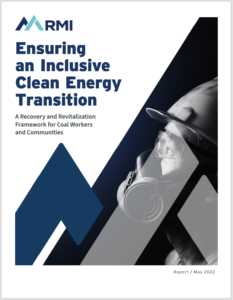Full Title: Ensuring an Inclusive Clean Energy Transition: A Recovery and Revitalization Framework for Coal Workers and Communities
Author(s): Claire Wang, Sam Mardell, Jeremy Richardson, Uday Varadarajan
Publisher(s): Rocky Mountain Institute (RMI)
Publication Date: May 25, 2022
Full Text: Download Resource
Description (excerpt):
Across the United States, the transition from coal to a clean energy economy is accelerating. However, without thoughtful planning and robust resources, this transition will harm workers who depend on coal for their livelihoods, as well as the communities where they live and work. These people and places face serious risks in the shift to clean energy, including loss of well-paying jobs with good benefits, loss of health insurance, reduced property values, gaps in local tax revenues, unfunded liabilities for environmental cleanup, and uncertainty around future community economic development.
Climate policy that is effective and durable must comprehensively address these social and economic challenges. The framework presented here can help federal and state policymakers to design and implement comprehensive climate policy that works for communities affected by the energy transition — and equip advocates to fight for strong policies.
Comprehensive climate and transition policy approaches can ensure that the energy transition uplifts — rather than abandons — coal workers and communities and those disproportionately bearing the brunt of health impacts from coal. Comprehensive policies can help create a healthy and thriving clean energy economy for all.
RMI’s recovery and revitalization framework, based on interviews with stakeholders as well as previous stakeholder-led platforms and principles for a fair transition, consists of three steps:
- Relief for coal workers and communities to alleviate losses of local revenue and jobs that occur immediately following coal closure
- Reclamation of remaining coal sites to prevent prolonged pollution risks and promote short- and medium-term job creation and local economic activity
- Reinvestment in coal communities to promote long-term economic resilience and diversification
